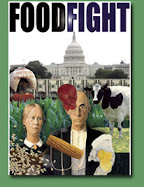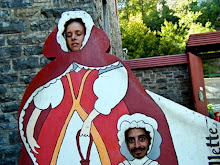
ice fishing at the Causeway
We are a small rural community (Grand Isle County.) We have farms, an unemployment issue, and a definite lack of available local food throughout our cold months. A lot of people here buy their groceries at beefed up gas station/convenience stores. A trip to Burlington will get you root vegetables, a scavenger hunt for some local winter greens, and a whole lot of mysterious frozen fruits and vegetables. By this I mean that at the Co-op you can by no-name organic and conventional frozen pineapple, mango, berries, corn, etc.... My first thought was that the store really got to work at the height of each fruit's season, and washed, peeled, and cubed until they could freeze enough to sell us throughout the off months. Brilliant. But, do they really? Or do they just re-parcel already frozen inventory on a weekly basis, right after they unload the truck? The official answer is that they arrive frozen from Woodstock Farms, often times having been grown in Thailand. I think you can also buy the same products in their original branded packaging in the same aisle.
Keeler Bay Variety
Every year some of our food shelfs turn away a local overabundance of winter squash as they are already inundated with them, and lack the necessary refrigeration space. Rockville Market Farm in Starksboro (where JP & I lived for a several years) has recently made a name for themselves by selling their packaged and frozen winter squash throughout the season. If you don't have a root cellar. winter squash will only make it so far. And it's hard not to appreciate the convenience of having your squash already peeled and cubed for you (unless you're a stuffer.) At a certain point in winter, even die hard 'Buy Local' shoppers are purchasing winter squash from parts unknown. Local frozen squash would be a blessing, as would pureed tomatoes, applesauce, corn, berries and vegetable broth.
Rockville Market Farm Squash
Here's the situation in a nutshell: just like an individual Zone 3 gardener struggles and fails to preserve the entirety of their explosive harvest for winter, Vermont as a whole is also struggling and (get your tissues) failing. Farmers are far too busy trying to earn their immediate income to focus their efforts on food preservation. Not all farms are able to pay for quality employees, and by this I mean skilled laborers; adults working with the same crops over enough years that they become adept and speedy with that particular harvest. People who you can leave in charge if you have to go away fro the weekend. Without these employees a farm's actions are limited, and food preservation is not at the top of the list.
Blue Heron Farm
So far, the solutions in place are mostly non-profits; gleaners and donators rather than preservers. I can't pinpoint the moment, but at sometime in my adult life I started to sour towards the concept of non-profits. Why can't communities becoming more self sufficient and healthy be totally into profit? Why do farms have to donate their leftovers instead of sell them? Why can't we buy local frozen produce in the winter, instead of trucked in 'fresh' food? And why can't we create jobs instead of over-stressing our food shelfs? Just so we can pat ourselves on the back and say we're good volunteers? Maybe it's because there is funding available for nonprofit ventures, but not for profit driven business models. I don't know the answer today.
my freezer
I do know that Vermont is nowhere near able to feed itself. Anyone watching the weather this week and the freezes in the Southeast can see that it's important for all northern states to make some progress in this direction. Seasoned gardeners eventually get the process down by staggering their crops, having harvest parties, and working really long days; communities as a whole need to follow a similar model. I'll be following this issue myself, and will keep you posted on the fate of the Mobile Quick Freeze Unit that could. Or maybe you want it? Anyone? Anyone?






















Excellent and thought provoking post...being from a more temperate (zone 8 W. Washington State), you struggles for local food in the winter is not something I have given much thought...I will be back to see how it is going! Kim
ReplyDeleteThis is a very important post! That small farms trying to make a profit are not supported towards preserving crops is shameful. Hugh subsidies go to mega farms as you are well aware. Surely with education Vermont will take the lead in becoming self sustaining through four seasons. Native Americans managed to live through winters for thousands of years. I am afraid it is political... and what is wrong on every other question. Our corporate controlled world. So we must just keep moving in a sane sustainable direction. We have winter farmers markets here in Northampton. Are you saying that Woodstock Farms grows food in Thailand? I will never support them again if this is true. I wish I could buy this freezer and donate it. What would the energy cost be? Maybe a fund raiser is call for here. National? People are seeing your points ... things will turn around . . . not because our leaders do anything but because we the people will demand it. I call congress regularly and will call about this issue of funds to help farmers preserve and store (hopefully organic) food for winter. If there is a better way to word it I would love you to share. I am sure there is a movement under way already. Thanks for your efforts here! Carol
ReplyDeleteit's unfortunate on so many levels! The freezer is valued at $40k, which seems like nothing compared to what it could achieve. I, of course, have dreams of setting up a cooperative so that all Vermont farms could sell their overflow produce to be packaged and frozen under one brand - not much different than how dairy cooperative operates. Seems so simple, but in many ways it's very complicated.
ReplyDeleteWoodstock Farms is a US corporation, but look at their site and just try to figure out where their food comes from. The woman at the co-op said that the bulk package read 'grown in Thailand.' Nice name, though...
Any information regarding the designer and manufacturer of the unit?
ReplyDeleteOperating specifications?
Charles, yes - the freezer was designed by Brian Norder of the Vermont Food Venture Center. The VFVC is a place that allows small agricultural and other food businesses to prepare and package their products on a grander scale, while adhering to food safety guidelines (but without investing in their own space and equipment.) I believe that it has finally relocated to Hardwick, VT.
ReplyDeleteMy follow up research from a few months back told me that the freezer unti had 'been placed' at Green Mountain College. No one could clarify if this was a purchase or rental or free loan type of arrangement, or even if the freezer was still available. I think that Brian would be a good place to start if you're interested.